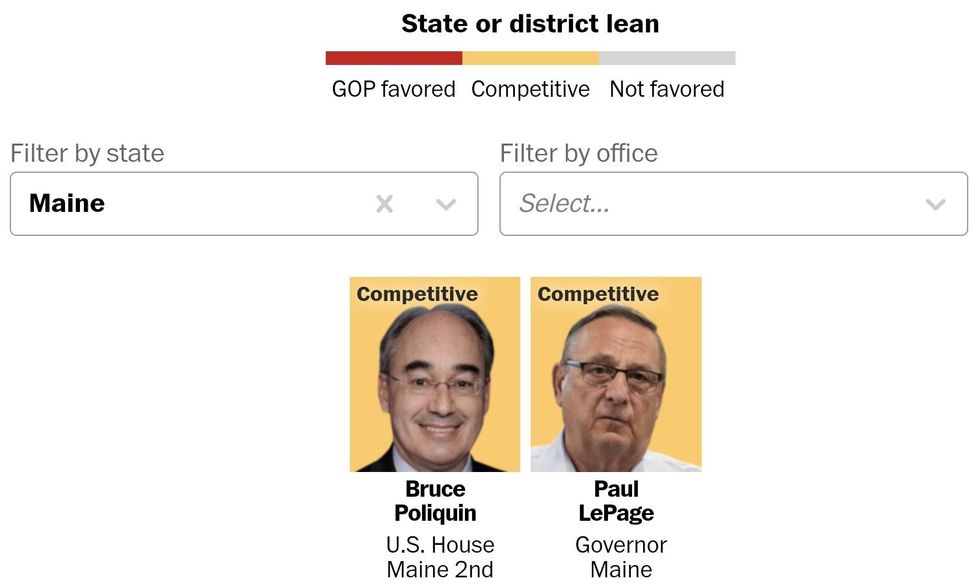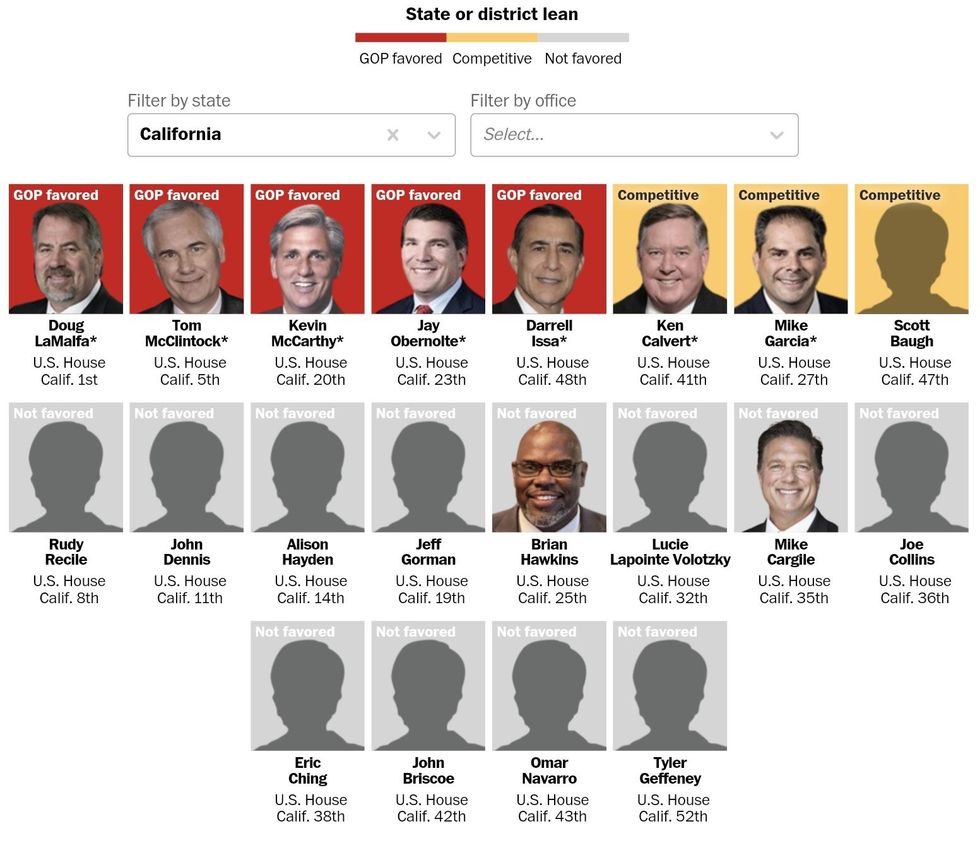An analysis by The Washington Post of statements made by Republican candidates for the 2022 midterms determined over 50% have either outright denied or questioned the validity of the 2020 presidential election results.
The WaPo looked at 569 GOP candidates for the United States House of Representatives and Senate as well as key state offices.
299 Republicans either refused to accept the fact Democratic President Joe Biden won both the popular and electoral votes in 2020 by a significant margin or publicly questioned his victory over former Republican President Donald Trump.
\u201cElection deniers will be on the ballot in 48 of 50 states and make up more than half of all Republicans running for congressional and state offices in the midterm elections.\n\nFind out how many election deniers are on your ballot this fall: https://t.co/4uZX7pzpqD\u201d— The Washington Post (@The Washington Post) 1665244829
WaPo also looked at which of those candidates are projected to win.
According to WaPo:
"More than 170 election deniers are running in districts or states where Republicans are expected to win, according to Cook Political Report race ratings and Partisan Voter Index."
"Dozens more are in competitive races."
The publication provided a tool for voters to see where their state stands.
\u201cElection deniers will be on the ballot in 48 of 50 states in the midterm elections this November.\n\nNearly 300 Republicans seeking those offices have denied the outcome of the last presidential election, according to a Washington Post analysis. https://t.co/wfflvbjOeZ\u201d— The Washington Post (@The Washington Post) 1665179768
For example, in Maine Republican candidates Bruce Poliquin and Paul LePage are in competitive races with their Democratic rivals, Representative Jared Golden and Governor Janet Mills.

Election deniers Poliquin and LePage are vying to retake government positions they previously held.
Poliquin was defeated in the 2018 midterms by Golden. Mills succeeded LePage after he was term limited out of the governor's office.
In California, 20 election deniers got their party's nomination for the 2022 midterm ballot.

Only five—all incumbents—are expected to win, including House Minority Leader Kevin McCarthy.
Three more are in competitive races while 12 are not expected to win.
The implications of so many election deniers gaining positions of power at the state and federal level would be far reaching. All would have some influence over how future election winners ajre determined.
Many of the GOP candidates continue to parrot Trump's Big Lie despite the 2020 presidential election being thoroughly investigated and all of Trump's claims being dismissed by Trump administration officials and the courts. According to experts, the perpetuation of these false claims—regardless of a lack of any evidence—demonstrates these GOP candidates willingness to undermine democracy whenever it benefits their side.
Instead of conspiracy theories and lies being on the fringe, they're front and center in many Republican campaigns.
In Michigan, Trump campaigned for three election deniers: Tudor Dixon for governor, Matthew DePerno for attorney general and Kristina Karamo for secretary of state. All three ofgices have significant control over how future Michigan elections would be decided.
Speaking to a crowd of his supporters in Warren, Michigan on October 1, Trump said:
“I don’t believe we’ll ever have a fair election again."
“I don’t believe it.”
It's become abundantly clear that in the MAGA universe, an unfair or fraudulent election is any election they don't win.
Scholars drew parallels between the prevalence of election deniers in the GOP with the rise of authoritarian movements historically and at present globally. Authoritarian efforts buoyed by religious extremism or ethnic cleansing often begin with delegitimizing free and fair elections and the free press.
Trump made a key focus of his administration and political campaigns to do both.
The close connections between Trump's MAGA movement, Christian nationalism, White nationalism and White supremacy are neither unexpected nor unintentional in the authoritarian's playbook per political scholars and historians.
People were unsurprised, but disturbed by the numbers of Republican candidates espousing false claims and conspiracy theories.

\u201c\ud83c\udd98 299 Midterm Republican Candidates on 2022 ballot still Deny & Dispute the 2020 Presidential Election Results, per WaPo Report.\n\nTo Defend Democracy\nWe Must All Vote Democratic.\n\nSee who the GOP Election Deniers are & where they are running near you:\u2b07\ufe0f\n\nhttps://t.co/LPcSBI4Vws\u201d— KP\ud83d\ude4c\ud83c\udfff\ud83d\udc99\ud83d\ude4c\ud83c\udffb (@KP\ud83d\ude4c\ud83c\udfff\ud83d\udc99\ud83d\ude4c\ud83c\udffb) 1665091496
\u201cWaPo says 299 GOP candidates- many running for AG - are ELECTION TRUTH DENIERS.\nThis is a LIE that fuels authoritarianism.\nFascism.\nYour vote has never been more VITAL to our democracy. \n#VoteBlue2022\u201d— LisaDelao \ud83c\uddfa\ud83c\udde6 (@LisaDelao \ud83c\uddfa\ud83c\udde6) 1665094984
\u201cGOP candidates in a nutshell:Over half the GOP candidates running in 2022 are election deniers,\na dog killer,a violent abortion liar,Jan 6 involvement,\nand stupidity across the board.@GOPLeader @GOP\u201d— ANN SISCO 1 1 (@ANN SISCO 1 1) 1665081264
\u201c299 GOP candidates in the 2022 midterm elections are election deniers running on the lie that voter fraud is rampant (it\u2019s negligible) & the 2020 election was stolen. If they win \u2014 would they fairly count YOUR vote? Answer is obvious \u2026\u201d— Mary Dominiak #BLM (@Mary Dominiak #BLM) 1665281372
\u201cGOP candidates in states including Wisconsin, Pennsylvania, and Arizona are laying the groundwork to challenge an unfavorable result.\n\n https://t.co/egKLM8A1jU\u201d— Vox (@Vox) 1665219863
\u201cAll those GOP candidates running for different positions, and they are election deniers, they are just cowards!\u201d— Nathaniel Schuler (@Nathaniel Schuler) 1665332573
\u201cSo 299 GOP candidates that are 2020 election deniers are running for office in ELECTIONS\u2026I\u2019m assuming they will only believe their election is legit if they win?! \n\nThis is not sustainable and if you think Democrats are gonna roll over and take this\u2026you are very wrong. \n#Resist\u201d— BAB (@BAB) 1665317954
\u201c299 GOP candidates in the November election are election deniers. In other words, they do not accept the outcome of the 2020 election. Many have already laid the groundwork to deny this election if they lose.\u201d— martyargyle \ud83c\udff3\ufe0f\u200d\ud83c\udf08 (@martyargyle \ud83c\udff3\ufe0f\u200d\ud83c\udf08) 1665090695
\u201c299 GOP candidates (53 % of the 569 analyzed) are election deniers. across nearly all states, at ALL levels of government, & a majority are in Rep. heavy states/districts and will win.\n\nbut yea, go ahead and sit out this vote cause you're so damn adamant that it "doesn't matter"\u201d— Saba Laba DingDong (@Saba Laba DingDong) 1665184490
\u201cOver half the GOP candidates running in 2022 are election deniers! How the hell did we get to this point? I\u2019m truly afraid we are witnessing the end of the America of democracy, hope, respect of others. All bc of one horrible creature https://t.co/iFLCZI381X\u201d— Warden #stand with Ukraine\ud83c\uddfa\ud83c\udde6\ud83c\uddfa\ud83c\udde6\ud83c\udf3b (@Warden #stand with Ukraine\ud83c\uddfa\ud83c\udde6\ud83c\uddfa\ud83c\udde6\ud83c\udf3b) 1665074171
The 2022 midterms are set for in-person voting on Tuesday, November 8. Absentee voting varies by state.
You can check your voter registration status here.








 @PreetBharara/X
@PreetBharara/X @RepBrendanBoyle/X
@RepBrendanBoyle/X @twesq/Bluesky
@twesq/Bluesky @christopherharris/Bluesky
@christopherharris/Bluesky @evangelinewarren/X
@evangelinewarren/X






 @FrankC164/X
@FrankC164/X
 AMC
AMC